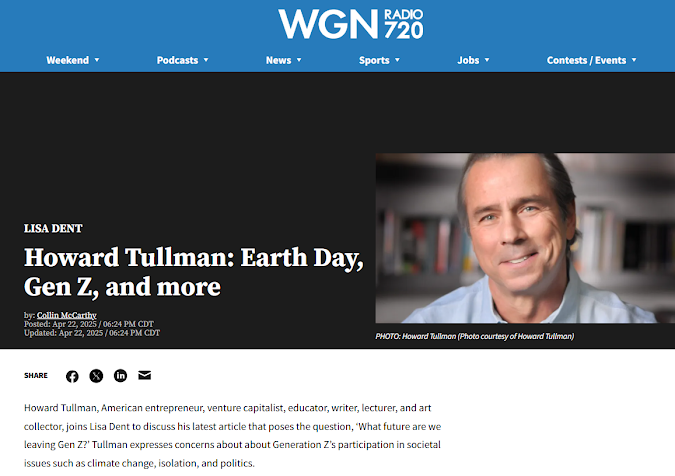Wednesday, April 23, 2025
Tuesday, April 22, 2025
NEW INC. MAGAZINE COLUMN BY HOWARD TULLMAN
Spending
your days alone in front of a computer screen–even on Zoom–is a recipe for
social disintegration. We need to get Zers more engaged.
EXPERT OPINION BY HOWARD TULLMAN, GENERAL MANAGING PARTNER, G2T3V
AND CHICAGO HIGH TECH INVESTORS @HOWARDTULLMAN1
APR 22, 2025
We already know that for
all the substantial benefits that various new digital tools and technologies
have created and notwithstanding the many ways in which they have irrevocably
altered our lives, these disruptive change agents have been accompanied by a
host of problems, trade-offs, and downsides.
Facebook may have
proposed to connect the whole world, but basically that global reach has
facilitated the company’s ability to spread its social media poison worldwide
and empower MAGAts and trolls everywhere. Targeting and tormenting vulnerable
teenage girls for creeps and corrupt advertisers isn’t exactly an achievement
that Sheryl Sandberg should be proud of leaning into. Zuck’s mindless and
shameless promotion and amplification of Russian and right-wing rumors, lies
and propaganda undoubtedly help to elect the Orange Monster who is now
destroying both our democracy and our economy.
Unfortunately, even
though we see more and more of these adverse consequences on our employees,
families, and country, we’ve decided to largely feign ignorance and to spend as
little time as possible admitting, addressing or attempting to remedy any of the
ills we’ve brought upon ourselves and our children.
Now we face the
likelihood that A.I. in all its incarnations will only exponentially accelerate
these critical threats and societal concerns. As older adults, with the benefit
of prior times and the attitudes of the good old days, we’re fairly safe and secure;
theoretically, we can consciously assume the risk of these threats in part
because we’ve had an appropriate and thoughtful foundation as we grew up. Also,
because we won’t be around here too much longer anyway to be subject to the
perils of the new world.01:49
But what about the
problems we’re foisting on our younger employees and our kids, who have no
choice in the matter? Can we give them a hand and a little help before we shove
off?
So much of what we’re
likely to see in the future will be simulated, synthetic, and soulless that
it’s extra important now to try to share and sustain a few important traditions
and rituals that were a part of our own youth. Mentors can work miracles if anyone’s
willing to listen to them. This critical sharing, spreading, and transferring
of knowledge and experience to future new business builders and leaders as well
as to our own offspring is how we can try to create compelling cultures,
preserve morals and values, and help sustain a solid societal foundation for
our country. That’s especially true in turbulent and confusing times like
these.
By simply targeting the
technologies and platforms and blaming the tools, we don’t even fairly
acknowledge our own roles in enabling some of the longer-term damage and
lasting adverse emotional and psychological effects these developments are
having, especially on Gen Zers. Surveys from Gallup and the Walton Foundation
report that this generation basically doesn’t trust anything. Not politicians,
not lawyers or courts, not academics, and not law enforcement.
Apart from the
depressing list of consistent disappointment they grew with, including 9/11,
the non-existent weapons of war offered as justifications for invasions, the
Iraq war, the financial crisis, and the pandemic, it’s no wonder that they have
no faith, no anchors, no fundamental values, and no patience. They’re all in a
hurry, they think they’re making good time, but they’re going nowhere.
Dopamine, constant consumption, and the desire for instant gratification drive
their behaviors and it’s all facilitated by our manipulative technologies.
Pervasive and
omnipresent technology has sped up every aspect of our lives (call it “hurry
sickness”) with all of us as willing participants and beneficiaries who are
pleased and grateful without really understanding or appreciating the
accompanying costs. In addition, the new tools – especially the smart phone
with its embedded camera – have done a great job of sterilizing our
interactions, hiding our appearances and emotions, and separating us from
actually and authentically experiencing so many important aspects of our
day-to-day lives.
Do you think for a
moment that anyone has actual friends on Facebook? I’ve asked dozens of these
Gen Zers how many close friends they have from their childhood, which is where
the most important connections begin or, for that matter, how many they have right
at the moment and the responses are unbelievably depressing. Most men are
lucky, if pressed, to recall a single good one that they’ve kept in regular
touch with over the years and most also report that, apart from peers at work
who they sometimes socialize with, they have no other close companions.
Families these days are also widely dispersed and no longer provide the
support, connection and stability they previously did, regardless of their
economic level.
Sitting for untold hours
in a closed room before a screen – regardless of its content – is no substitute
for face-to-face interactions with parents, peers and prospective partners.
It’s no way to form lasting memories, and it’s ultimately an emotionally sterile
and unsatisfying experience. You don’t “play” a computer game – it plays you.
You sit largely passively before a device designed to serially challenge,
seduce and reward you for a bunch of useless accomplishments and valueless
achievements. You never directly interact with another person and frankly you
ultimately learn nothing from the process. Endless effort, empty calories and
no gain.
We have kids hiding
behind keyboards to bully and torment others, and creeps spending all day
trying to seek out children for every kind of perverse purpose. Snapchat
publicly admits to receiving 10,000 reports of sextortion per month. And
with the explosion of mobile sports gambling hard on
the heels of online gaming, things will only get worse and more perilous.
We’ve made the speed (of
everything) the prime directive and objective in our lives. Time is scarce,
attention is fleeting, and the technocrats have taught us to believe that we
can have it all and have it right now as well. Our world spins faster and faster
and we never really have the time any more to luxuriate in the moment or recall
a storied past.
Everything, as President
Barlett always asked in The West Wing, is
about “what’s next?” and we quickly lose sight of and interest in virtually
everything that is and was. Thinking about tomorrow is all well and good, but
not if it immediately diminishes the value and importance of today.
This tendency is why
Trump is such a successful and perpetual liar – no one cares or even remembers
what he lied about yesterday. Driven by frenzied media, we’re always focused on
the next crisis, outrage, or blunder.
Worse yet, our kids have
lost all interest in the past, in reading virtually anything, in studying
history, in our traditions and – most importantly – in the lessons we’ve
learned and the painful experiences we’ve lived through and would love to
share. It’s hard to imagine how a culture will persist and strengthen over time
if we continue to teach the next several generations that everything is
temporary; all material matters are readily disposable or replicable; and that
there is nothing to be gained by looking backwards. And that we can
quickly and cheaply substitute artifice and artificial environments like
amusement parks for the real, hands-on, and authentic activities and the
crucial inter-personal communications and relationships that were so much an
important part of our own youth and development.
Watching concert
attendees attempting to view and capture a performance through their phones
rather than simply watching and listening is a sad sight. Seeing parents
directing and ordering their kids around and ignoring guests at the kids’ own
birthday parties in order to frantically pose all the participants for crappy
videos which few, if any, will ever see again sucks all the joy and actual
enjoyment out of the occasion. We seem to forget that as adults we’ve already
made most of our memories – now it’s our kids’ turn – but we’re intent on
enlisting our own offspring in painful and stressfully staged rituals that are
no fun for anyone and certainly nothing to fondly remember.
Or worse yet, we drag
them to Disney-like artificial environments where the entire family can
substitute conspicuous consumption for any kind of substance, learning or truly
memorable experiences. The Space Mountain in the Magic Kingdom will never
replace the Matterhorn, or for that matter, even an evening in a make-shift
tent under the stars in your own backyard.
Monday, October 21, 2024
LOOP NORTH NEWS - HOWARD TULLMAN - DON'T SEND YOUR KIDS TO COLLEGE


By Howard Tullman
21-Oct-24 – Want your kids to still love you when they’re in their 30s, when they’ve started work at a real job, busted their butts for a few years, maybe had a child or two of their own, and hopefully come to appreciate how hard you had to work – at whatever you did – to provide them with viable options and serious opportunities for a strong and secure future?
If so, then now’s a great time to do your offspring a real favor, wherever they are on the education and employment treadmill. Tell them that, for the next decade or so, the smart money is on vocational training, OJT, and concrete careers rather than investing four or more years on college and grad school followed by a fruitless search for employment in areas of the economy that are disappearing. Today, I’d rather be a longshoreman than a lawyer, a builder rather than a banker and, for sure, a plumber rather than a political science major.
The ugly alternative for millions of students whose parents, like so many lemmings, followed the traditional route and fumbled their kids’ future, is to condemn them after college to a few years of wishful thinking, lots of numbing networking, go-nowhere gigs, and endless pleading emails to family and friends. All of that accompanied by a challenging clump of college debt that will likely be an albatross around their necks for decades.
 | (Left) Welders working on a caisson form on the Chicago River west of Dearborn Street. |
In addition to the unavoidable loan repayment load, these graduates suffer from the deluded and misleading indoctrination offered by the faculties of most colleges and universities. These Ph.D. fantasy factories do a miserable job of setting realistic expectations and goals for their graduates.
A-range grades at Harvard and Yale represent almost 80 percent of all grades “earned” by students at these two schools. You might ask yourself how those participation awards compare with the typical distribution of team members’ performances in your company and how this kind of “everyone’s a star and a winner” crap is helpful in preparing students for the vagaries and vicissitudes of the working world. Inflated grading on a curve doesn’t help anyone outside of these institutions although it keeps the campers and their parents happy.
The reason we’re seeing so many employers unhappy with the newest crop of employees has a lot more to do with attitude problems, unreal expectations, and accelerated entitlement than with actual aptitude. That’s because in the real world of work, you learn a cruel lesson early on: that the amount of education you allegedly need to get a job has risen much faster than the amount of education you actually need to do a job.
There are three main reasons for this disparity:
First, the present job occupants don’t want new, younger threats to their own positions, so they raise the bar, expand the requirements, and effectively pull up the drawbridge. But much to their dismay, the inbound tide is unstoppable. By 2025, there will be more Gen Zs in the workforce than boomers – and the Gen Zs are coming for those very jobs.
Second, there are fewer and fewer available jobs in certain “soft skill” sectors like banking, finance, and publishing, because the mid-level positions in every organization are being compressed or eliminated. So, the competition for scarcer slots is fiercer than ever and the paper credentials required are more substantial, even though they may have little bearing on the candidate’s actual ability to do the job in question.
In the long haul, preparation, perspiration, and passion ultimately win out over diplomas from even the fanciest schools. |  |
The third reason is the growth and expansion of disruptive technologies, which are changing the work requirements in many of these fields. There’s no doubt that automation, robotics, and AI are job killers, but the nasty little secret is that the expected devastation is highly targeted and primarily aimed at middle management, administrators, editors, and bean counters.
Jobs are on the front lines
But the good news is that the front-line folks – the ones who need to deal with and deliver the goods and services to the ultimate customers, the ones who work with their hands and their heads – will always have secure positions. This is true across the board, whether it’s construction, maintenance, early education, nursing and elder care, or anything in hospitality and retail. You’re always going to need a meat sack at the end of the production line if you care at all about customer satisfaction and results.
Columnist George Will says that we don’t have enough trained workers to build our nuclear subs, and those vessels are the most formidable tools we have to defend our shores and discourage our enemies on multiple fronts. We’re going to need millions of new team members to support our most fundamental industries and they’re not going to be coming exclusively from traditional colleges and universities.
I’m increasingly convinced that vocational education, industry apprenticeships, and union labor may save our kids as well as our ships. We all learn by doing, not just by watching or listening. It’s a “put up or shut up” world today. When you’re working side-by-side with others who’ve been there and done it, the ongoing “education” isn’t limited to specific physical skills; you learn a lot about cooperation, connection, community, and work ethic. Unlike college, it’s never just about you.
 | The bottom line: I’d rather be a welder than a writer, a mechanic not a mathematician, and a nurse rather than a naturalist. |
 | Howard Tullman is General Managing Partner for G2T3V, LLC – Investors in Disruptive Innovators, and for Chicago High Tech Investors, LLC. He is also the author of Words of Wisdom: A 60-year compilation. |
Tuesday, October 15, 2024
NEW INC. MAGAZINE COLUMN FROM HOWARD TULLMAN
In our emerging economy,
learning how to do something, like carpentry, may have more value than going to
a university for four expensive years.
EXPERT OPINION BY HOWARD TULLMAN, GENERAL MANAGING PARTNER, G2T3V
AND CHICAGO HIGH TECH INVESTORS @HOWARDTULLMAN1
OCT 15, 2024
Want your kids to still love you when
they’re in their 30s, when they’ve started work at a real job, busted their
butts for a few years, maybe had a child or two of their own, and hopefully
come to appreciate how hard you had to work – at whatever you did – to provide
them with viable options and serious opportunities for a strong and secure
future?
If so, then now’s a great time to do
your offspring a real favor, wherever they are on the education and employment
treadmill. Tell them that, for the next decade or so, the smart money is
on vocational training, OJT and concrete careers rather than investing four or
more years on college and grad school followed by a fruitless search for
employment in areas of the economy that are disappearing. Today, I’d rather be
a longshoreman than a lawyer, a builder rather than a banker and, for sure, a
plumber rather than a political science major.
The ugly alternative for millions of
students whose parents, like so many lemmings, followed the traditional route
and fumbled their kids’ future, is to condemn them after college to a few years
of wishful thinking, lots of numbing networking, go-nowhere gigs, and endless
pleading emails to family and friends. All of that accompanied by a
challenging clump of college debt that will likely be an
albatross around their necks for decades. In addition to the unavoidable loan
repayment load, these graduates suffer from the deluded and misleading
indoctrination offered by the faculties of most colleges and universities. These
Ph.D. fantasy factories do a miserable job of setting realistic expectations
and goals for their graduates.
A-range grades at Harvard and Yale
represent almost 80% of all grades “earned” by students at these two schools.
You might ask yourself how those participation awards compare with the typical
distribution of team members’ performances in your company and how this kind of
“everyone’s a star and a winner” crap is helpful in preparing students
for the vagaries and vicissitudes of the working world. Inflated grading on a
curve doesn’t help anyone outside of these institutions although it keeps the
campers and their parents very happy.
The reason we’re seeing so many employers unhappy with the newest crop of
employees has a lot more to do with attitude problems, unreal expectations, and
accelerated entitlement than with actual aptitude. That’s because in the real
world of work, you learn a cruel lesson early on: that the amount of education
you allegedly need to get a job has risen much faster than the amount
of education you actually need to do a job.
DON’T FIGHT THE TREND
There are three main reasons for this
disparity:
First, the present job occupants don’t
want new, younger threats to their own positions, so they raise the bar,
expand the requirements, and effectively pull up the drawbridge. But much to
their dismay, the inbound tide is unstoppable. By 2025, there will be more Gen
Z’s in the workforce than boomers– and the Gen Z’s are coming for those very
jobs.
Second, there are fewer and fewer
available jobs in certain “soft skill” sectors like banking, finance, and
publishing, because the mid-level positions in every organization are being
compressed or eliminated. So, the competition for scarcer slots is fiercer than
ever and the paper credentials required are more substantial, even though they
may have little bearing on the candidate’s actual ability to do the job in
question. In the long haul, preparation, perspiration and passion ultimately
win out over diplomas from even the fanciest schools.
The third reason is the growth and
expansion of disruptive technologies, which are changing the work requirements
in many of these fields. There’s no doubt that automation, robotics and AI are
job killers, but the nasty little secret is that the expected devastation is
highly targeted and primarily aimed at middle management, administrators,
editors, and bean counters.
WHERE THE JOBS ARE
But the good news is that the
front-line folks — the ones who need to deal with and deliver the goods and
services to the ultimate customers, the ones who work with their hands and
their heads — will always have secure positions. This is true across the board,
whether it’s construction, maintenance, early education, nursing and elder
care, or anything in hospitality and retail. You’re always going to need a meat
sack at the end of the production line if you care at all about customer
satisfaction and results.
Columnist George Will says that
we don’t have enough trained workers to build our
nuclear subs and those vessels are the most formidable tools we have to defend
our shores and discourage our enemies on multiple fronts. We’re going to need
millions of new team members to support our most fundamental industries and they’re
not going to be coming exclusively from traditional colleges and universities.
I’m increasingly convinced that
vocational education, industry apprenticeships, and union labor may save our
kids as well as our ships. We all learn by doing, not just by watching or
listening. It’s a “put up or shut up” world today. When you’re working side-by-side
with others who’ve been there and done it, the ongoing “education” isn’t
limited to specific physical skills; you learn a lot about cooperation,
connection, community and work ethic. Unlike college, it’s never just about
you.
The bottom line: I’d rather be a
welder than a writer, a mechanic not a mathematician, and a nurse rather than a
naturalist.
Tuesday, January 23, 2024
NEW INC. MAGAZINE COLUMN FROM HOWARD TULLMAN
Why Older Workers Are Now the Better Choice
There's a lot to be said
for youth and inexperience, but many companies today need wiser, more
experienced workers to get them through the next business cycle. It's time to
go gray.
EXPERT OPINION BY HOWARD
TULLMAN, GENERAL MANAGING PARTNER, G2T3V AND CHICAGO HIGH TECH
INVESTORS@HOWARDTULLMAN1
As more and more
businesses begin to feel confident about the stickiness of the post-pandemic
economy, and their revenues crest or outstrip their pre-Covid levels, company
owners and managers are beginning to slowly try to hire back people they have
let go in the last three years. That's not necessarily an easy task because a
lot of their former team members have moved on, moved out, or aren't interested
in returning to their old jobs.
To allow this rebuilding
to be done at scale is also going to require a sizeable amount of attitude
adjustment on the part of all the parties. Millions of young people think the
stock market only goes up and that the world is just waiting to make them rich.
Millions of middle-aged people thought they had signed up for lifetime
employment and now are learning that they need to be lifelong learners to stay
relevant and employed. What keeps growing never grows old. And millions of
aspiring entrepreneurs think that tech is going to solve all the world's
problems if the old guys will just get out of the way. It's going to take a lot
of patience, pain, and perseverance to pull off this process of re-upping and
reloading the workforce.
Hiring the right number,
desired skillsets and demographic mix of new employees is clearly more
challenging than before because rapid advances in various AI technologies, new,
increasingly intelligent robotics, and the expanded automation of many traditional
processes have changed the game. A significant number of the old positions have
been eliminated (or compressed) and many others require new and different
skills.01:23
As a result, the job
descriptions and search parameters for qualified candidates who are already
trained and can smoothly step into the open slots have also been altered and
updated. Experience and expertise are going to be highly valued, along with the
ability to hit the ground running. The last thing that many of these companies
desire is to spend a lot of scarce dollars for on-the-job training.
Another large group of
theoretical prospects are the pools of recent college graduates -- a great
number of whom have never had a full-time job. Unfortunately, far
too many of them have unrealistic compensation goals, work-life expectations,
and other employment requirements, which make them less attractive and riskier
hires. They don't seem to have gotten the memo about what "work" actually means in
the real world. They've also never lived through a real economic downturn or
suffered through a recession and seen friends and families lose their jobs,
savings, and sometimes far more than that.
So, they're softer, less
resilient, and aggressively impatient -- but not in a good way. Since things
have largely always gone their way, they haven't really learned much about
adversity or the bitter compromises everyone eventually makes in life. You
don't really learn from good experiences and success -- you just keep doing
things the same way that you always have done.
Energy, enthusiasm, and
eagerness used to be critical considerations in
hiring new employees. These are still important attributes, but we're facing
another year or two of market uncertainty, slow and careful growth rather than
explosive leaps, and an overall interest in patience, prudence and hunkering
down to weather the next storm. Security, stability, and liquidity are going to
be top of mind for senior management, stockholders, and stakeholders and no one
wants to be seen hanging way out over their skis.
As a result, in the
smartest and most competitive companies, we're going to see another dramatic
shift in their hiring perspectives: more focus on gray hair, prior, relevant
work experience and, maybe most importantly, men and women of a certain age who
are now far more readily available in significant numbers. They're grounded,
serious and realistic and they're much more about taking orders than taking
risks, and that's a good thing. These are the mid-careerists who've seen the
hard times and remember the troughs and valleys that always offset the peaks
and moonshots that have been all the media rage for the last two decades.
The pampered and
hyper-parented Gen Zers have heard incessantly, their whole lives, about home
runs, trees that grow to the sky, and the glory days. By contrast the older
folks have seen the bumps in the road as well. People who've maybe lost a
serious job or two; who have serious financial, family, and other
obligations; and, frankly, who are likely to be excited and grateful to be
rejoining the working world at this point in their careers. What they may lack
in speed and reaction time is far less critical in the tortoise times to come
when only the craziest rabbits are running amok. The fact that they appreciate
the opportunity and what they can make out of it instead of regarding a job as
something they're willing to settle for in the moment tells a smart employer
everything you need to know.
Resilience is a powerful
muscle that grows stronger over time and through repeated exercise and testing.
Our teams need it now more than ever.
LINKS TO RELATED SITES
- My Personal Website
- HAT Speaker Website
- My INC. Blog Posts
- My THREADS profile
- My Wikipedia Page
- My LinkedIn Page
- My Facebook Page
- My X/Twitter Page
- My Instagram Page
- My ABOUT.ME page
- G2T3V, LLC Site
- G2T3V page on LinkedIn
- G2T3V, LLC Facebook Page
- My Channel on YOUTUBE
- My Videos on VIMEO
- My Boards on Pinterest
- My Site on Mastodon
- My Site on Substack
- My Site on Post
LINKS TO RELATED BUSINESSES
- 1871 - Where Digital Startups Get Their Start
- AskWhai
- Baloonr
- BCV Social
- ConceptDrop (Now Nexus AI)
- Cubii
- Dumbstruck
- Gather Voices
- Genivity
- Georama (now QualSights)
- GetSet
- HighTower Advisors
- Holberg Financial
- Indiegogo
- Keeeb
- Kitchfix
- KnowledgeHound
- Landscape Hub
- Lisa App
- Magic Cube
- MagicTags/THYNG
- Mile Auto
- Packback Books
- Peanut Butter
- Philo Broadcasting
- Popular Pays
- Selfie
- SnapSheet
- SomruS
- SPOTHERO
- SquareOffs
- Tempesta Media
- THYNG
- Tock
- Upshow
- Vehcon
- Xaptum
Total Pageviews
GOOGLE ANALYTICS
Blog Archive
-
▼
2025
(607)
-
▼
September
(27)
- MAGAts
- Whitewashing Charlie Kirk Promotes Political Violence
- Did Trump Just Declare War on the American Left?
- What Happened Yesterday Was NOT About "Freedom."
- NEVER FORGET - NEVER FORGIVE THE ROTTEN SAUDIS WHO...
- Be careful not to inadvertently help sainthood Cha...
- Opinion Max Boot Russia’s drone incursion in P...
- JoJo on Trump
- New INC. Magazine Column from Howard Tullman
- Johnson is a Lying Pedo
- Frank Bruni
- The (Not-So-)Interim Docket
- EZRA KLEIN - VERY TIMELY AND IMPORTANT
- WHERE IS PEDO DON?
- Edwin Eisendrath Trump's cabinet is filled with t...
- https://www.threads.com/@auroradrone/post/DORhxlPD...
- The One Danger That Should Unite the U.S. and China
- JoJo
- Ty Cobb
- Trump has turned the Oval Office into a Las Vegas ...
- How Many...
- FORRINERS
- HOWARD TULLMAN JOINS LISA DENT ON WGN RADIO TO DIS...
- TULLMAN COLUMN IN LOOP NORTH NEWS
- NEW INC. MAGAZINE COLUMN FROM HOWARD TULLMAN
- Trump Train Runs Amok - Weak Stupid Republicans Si...
- More brain worms on the loose
-
▼
September
(27)


